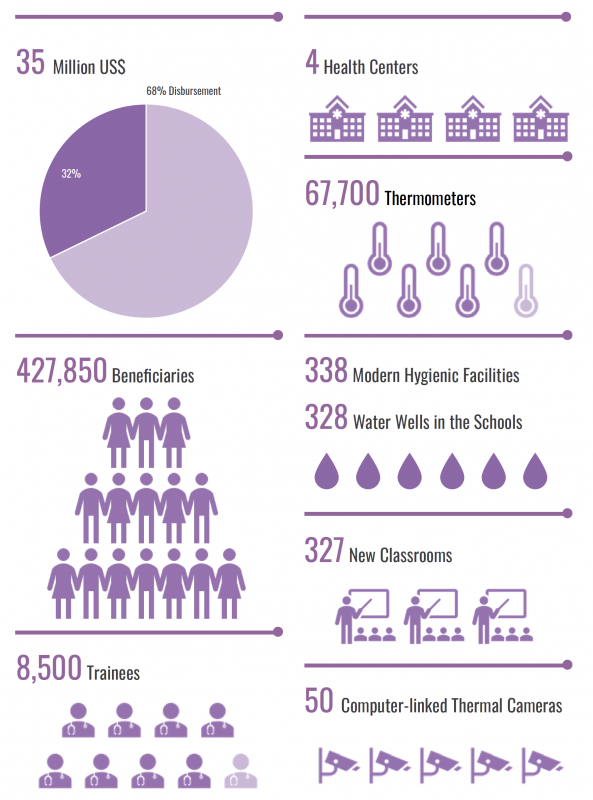In response to the exceptional 2014-2015 Ebola Virus Disease (EVD) epidemic in West Africa, the Custodian of the Two Holy Mosques, Late King Abdullah Ibn Abdul-Aziz Al Saud, donated US$35 million in support to EVD control in four West African countries.
Objectives
The aim of this project is to support the response to EVD and to ensure a safe and friendly environment for school reopening in the affected countries. The project contributed to the efforts made to combat the outbreak of Ebola in four African countries, namely Guinea, Liberia, Sierra Leone and Mali, and preventing its spread beyond these countries.
The project places special emphasis on the sectors of health and education, providing support for health infrastructure and the safe reopening of schools, which remained closed for long periods in these countries for fear of the spread of the disease among students. The allocated budget is distributed among the four countries as follows: US$12 million for Guinea, US$6 million for Liberia, US$6 million for Sierra Leone and US$2.5 million for Mali. On the other hand, an amount of US$8.5 million is reserved for crosscutting projects to strengthen the regional epidemiologic surveillance.
Beneficiaries
More than 67,000 thermometers were distributed to schools and health units. More than 8,500 teachers and health workers received training on the use of the thermometers and implementation of the prevention procedures. Training was also provided to numerous medical equipment specialists working in laboratories. Moreover, tens of thousands of children in schools and tens of thousands of passengers in airports and public places were examined for early diagnosis of the disease by equipment funded by the project.
Main components of the project
The first phase of the project was physically completed in Guinea and Liberia. However, in Mali it is expected to be completed in the last quarter of 2020, and in Sierra Leone by the end of 2021. The total number of direct beneficiaries is estimated at 427,850 persons. For Phase-II, the project will be directed to issues related to sustainability of interventions made in Phase-I.
- Training of 8,500 persons on epidemic preventive measures.
- Establishing 4 health centers to detect and treat the epidemic in the most affected places in Guinea.
- Distributing a total number of 67,700 thermometers to detect the disease in schools.
- Providing 338 modern hygienic facilities and 328 drinking water wells in the schools in Guinea and Liberia.
- Building 327 new classrooms in Sierra Leone to reduce the number of students per classroom in order to prevent transmission of the epidemic.
- Distributing 50 computer-linked thermal cameras to airports and public places.
Socio-economic results
The outbreak of Ebola caused heavy and unprecedented economic, development and human losses in West Africa, particularly in Sierra Leone, Liberia and Guinea. The negative economic impact affected public life in the three countries as a direct result of the drop in government revenues from taxes, customs fees and commodities, leading to inflation and an upsurge in prices of many consumer goods.
The three countries suffered from the increased number of casualties from the devastating epidemic, which had detrimental effects on progress and sustainable development results in those countries. The epidemic took its heavy toll on the social bonds within families due to the spread of panic among the patients and those with whom they interact with. The top priority for the schools was the provision of temperature sensors (at school entrances and educational facilities) to detect, isolate and treat teachers and students suspected of infection. Some of the airports and public places were provided with computer linked thermal cameras.
Thus, the project made a significant contribution in support of both sectors of education and health.

Success Story: Wymah
How King Abdullah Program (KAAP) for Ebola Control Impacted my Work at the Ministry of Health.
I am Wymah S. Youyoubon, the Director of the Healthcare Technology Management Unit (HTMU) in Liberia. This unit, established in 2010 within the Ministry of Health, was responsible for medical equipment procurement, maintenance, repairs, calibrations, installations, and training for biomedical equipment users and maintenance staff at all health facilities in Liberia. When I was assigned to the unit few years ago, we were only three biomedical equipment maintenance technicians to serve the entire country. This was a herculean task as the three of us had to commute almost on a regular basis from one county to another to provide support and maintenance services for these equipment. Imagine how difficult and stressful it was, given the distances and road conditions.
Those of you who have visited here will know what I am talking about. However, in 2016, the story changed with the support from the KAAP Program for Ebola Control. The project provided funding that supported the training of 18 persons (including myself) as Biomedical Equipment Technicians (BMETs) in the United States and Kenya for periods of 6 to 12 months. I was fortunate to be selected for the Advanced Biomedical Engineering Technology Training at the MediSend College in Dallas, USA. Upon my return, I continued to provide equipment repair and maintenance services at the Ministry of Health, and was later appointed to head the Healthcare Technology Unit. The HTMU now has a team comprising a total of 19 qualified BMETs. The government has deployed the BMETs to health facilities across the 15 counties to provide biomedical engineering services.
Prior to KAAP support, the team of three in the HTMU travelled almost daily from one country hospital to another. We had limited time with our families, limited skills in medical equipment maintenance services, lack of adequate tools to work with, limited number of staff, no dedicated workshop to carry out repairs or to maintain defective medical equipment, no spare parts, and lack of logistical support. With the knowledge and experience acquired so far, the team is capable of doing so many work like troubleshooting, installation of new equipment, and maintenance and repair of different types of equipment. I want to thank KAAP for all of the support. May God continue to bless the people of Saudi Arabia for the financial gift.




